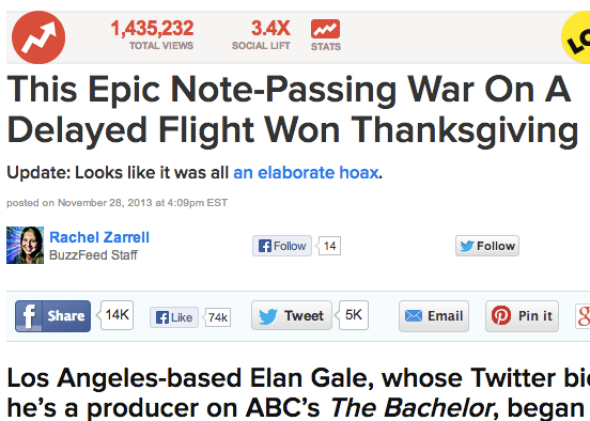Instead of doing something productive, like finishing chapter two of my book (it’s going well anyway!), I spent about an hour today noticing how the Internet had fallen for yet another hoax. Elan Gale, a producer for The Bachelor and thereby one of the worst people on the planet, spent part of Thanksgiving live-tweeting what he said was a feud with an irritating woman “in mom jeans” who complained too loudly about her flight delay. Gale sent her drinks and notes telling her to shut her mouth and “eat a dick.” The Internet loved it, especially BuzzFeed, whose Rachel Zarrell aggregated Gale’s tweets and photos. Her post, on one of the year’s slowest news cycles, got nearly 1.4 million reads.
One problem: Gale’s story was B.S. Maybe people should have sussed that out, as he took many photos but none of his “target.” But they didn’t. Zarrell got to write a follow-up aggregating more Gale tweets about how he punked everyone. I got irritated, not really at BuzzFeed but at Gale—again, Bachelor producer. This guy, for a living, comes up with ideas that stimulate the pleasure or anger centers of the lumpen proletariat’s brains. He did it on Twitter and captivated the Internet with a complete farce. I ribbed BuzzFeed about this (after all, the phony story was worth 1 percent of their record November traffic) and, after a friendly back-and-forth, politics editor McKay Coppins snarked me off.
McKay and I are friends IRL, and I wish our every Twitter interaction did not devolve into petty arguments, but come on—screw this. Elan Gale successfully hoaxed the Internet with a dumb, mean story. BuzzFeed fell for the hoax, with Zarrell tweeting at Gale to ask for an interview but never confirming anything about the flight. Any news organization should consider this a screw-up.
It’s not quite Lara Logan nodding like a parrot as her Benghazi source lies to her, but it’s the sort of shoddy reporting that would get a reporter at a small newspaper fired. Imagine you worked at the Pleasantville News-Leader and you ran an A-1 story about a fight that never happened. It goes viral; it gets debunked.You think you’re able to just walk away from that by mocking the haters?
Oh, I’m not saying BuzzFeed should fire anyone. It ran an update at the bottom of the post. I did ask the reporter, Zarrell, how this came about, but I’m not going to make some federal case out of this. Gale wasn’t grubbing for money or anything. As hoaxes go, this was mostly harmless.
But it wasn’t a fluke. That’s the problem. In just the past two weeks, the Internet has been told, by sources they trust (and share on Facebook), that a New Jersey waitress was stiffed on tips by an anti-gay family and that Amazon.com was about to launch product-delivering drones. This was just two months after Jimmy Kimmel created a sort of viral ad for his TV show, a video of a “twerk fail” that was reported by multiple TV news channels as real. Or real enough. Hey, it was a video on the Internet! In all three of these cases, readers were pointed to fake stories that were basically PR for successful businesses or—in the New Jersey case—a scam by a waitress whose collegues considered her an inveterate liar. How many news outlets tried to confirm these stories before running them? You don’t want to know.
So I’m a little disturbed by the glib response from BuzzFeed. What is aggregation for, anyway? And are people willing to create a lower standard for “reporting”—Zarrell is a reporter, who has worked for other news organizations—if it’s only about a viral story? Earlier this year, the Washington Post fired an overworked aggregator-reporter after she botched some facts. The Washington Post’s aggregation style is fairly unpopular—the paper wants to have some version of stories on its own site, so that readers stay there instead of heading to Yahoo! or Politico. But the aggregations are pretty bland and fact-based. None of them goes as mega-viral as “This Epic Note-Passing War on a Delayed Flight Wins Thanksgiving.” And Zarrell’s story wouldn’t have gone viral if she’d decided that Gale’s story was too flimsy to run with. She wouldn’t have gotten 1.4 million hits. She would be, today, a less valuable employee to BuzzFeed, and someone at ViralNova or the Huffington Post (which also swallowed the story) would be more valuable.
This is fairly messed up. Yes, people on the Internet want to believe salacious stories. Reporters want to publish stories that people read. If there’s a great reward, and little downside, to be had in publishing B.S., the Internet’s going to get more B.S. As one of my colleagues put it, “‘Too good to check’ used to be a warning to newspaper editors not to jump on bullshit stories. Now it’s a business model.”
UPDATE: BuzzFeed news director Lisa Tozzi comments:
Like a number of other organizations, we picked up on the Thanksgiving Elan/Diane saga early on as it was blowing up on Twitter. We used the word “claiming” to describe Elan’s tweets, and updated our post several times as it appeared to unfold—but we should have make that skepticism clearer.
We’re not in the business of publishing hoaxes and we feel an enormous responsibility here to provide our readers with accurate, up-to-date information. We have since published an update to the original Elan/Diane story as well as a second follow-up noting that this confrontation didn’t happen.
Write this in as a “happy ending.” Salty language aside, my beef is with the hoaxers who keep taking advantage of social media, not with BuzzFeed. With luck, this might be the meme that broke the camel’s back.
